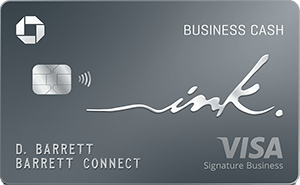
Issuers use annual revenue, along with income and personal credit score, to determine approval for a business credit card.
Claire TsosieAssigning Editor | Credit cards, Medicare, business software, moving services, home improvement
Kelsey SheehySenior writer | Small business banking and credit cards, Paycheck Protection Program, consumer spending, and household finances
Last updated on February 8, 2024Assigning Editor | student loans, student loan repayment plans, and education financing

Many or all of the products featured here are from our partners who compensate us. This may influence which products we write about and where and how the product appears on a page. However, this does not influence our evaluations. Our opinions are our own. Here is a list of our partners and here's how we make money.
⏰ Estimated read time: 4 minutes
When reporting annual revenue on a business credit card application, issuers generally want to know your verifiable gross revenue from the previous year. While it’s tempting to puff up your total or include projections, a big revenue number isn’t necessary to get approved.
Annual business income is just one factor issuers consider; most card issuers also look at your personal credit history and income. That means even new businesses with little to no revenue can qualify for one of the best business credit cards if the owner has a strong personal credit score.

Ink Business Cash® Credit Card
NerdWallet Rating Bonus Amount Read ReviewAnnual business revenue is the total income your company generates over the course of a year — from products sold, services performed, fees received and interest or dividends earned — before subtracting tax deductions or operating expenses.
This figure is important, as it’s needed to apply for a business credit card, file taxes and qualify for a small business loan, among other things.
It’s important to stick to the facts when reporting your business’ gross annual revenue on a business credit card application. But don’t sell yourself short. Here’s what to do.
Determine your gross annual revenue. This is your revenue before taxes and other expenses are taken out. This is different from profit, which is revenue minus costs.Gross revenue can include several sources of business income, such as selling business products and services, surplus equipment or property or even stock in your business.
Exclude any personal income. If you work a full-time job and sell items on eBay as a side hustle, for example, income from your full-time job shouldn’t be considered “revenue.” Instead, include it in the “income” field of the application.
Pull revenue from the right time frame. Your figures should be from the previous year. Generally, that means you shouldn’t be reporting sales projections as revenue, although some issuers may be OK with that if your business is new.
Make sure you can verify any information. Don’t report it if you can’t verify it. In some cases, issuers may ask you for paperwork to back up the numbers you reported, so it’s best to stick to what you can prove.
Update your revenue information as needed. Your company’s revenue can influence your credit limit. If your verifiable annual revenue improves after you’re approved, be sure to update that information with the issuer — especially if you want a business credit card with a higher limit.
Does your business generate a lot of revenue? Consider a corporate credit card. These cards are only available to incorporated businesses, and approval is based on factors like annual revenue and money in the bank instead of personal credit. For businesses that qualify, corporate cards can offer greater spending power — with no personal guarantee.
New businesses can still get a business credit card, even if they don’t yet have revenue. Simply put $0 in the annual revenue field if your business has no actual revenue. Issuers will instead look at your personal income and credit score to determine approval and credit limit.
You also don’t have to have a registered business — say, a limited liability company or an S corporation — to report revenue on a small-business credit card application. You can also report revenue as a sole proprietor.
You might be a sole proprietor if you: Drive for a ridesharing service. Sell items online. Work as a freelance graphic designer.If you’re a sole proprietor, be sure to indicate this on your application when the issuer asks about your business’ legal structure. And in the field where you add your business tax ID, put your Social Security number instead.
AdvertisementInk Business Unlimited® Credit Card
Ink Business Cash® Credit Card
The Blue Business® Plus Credit Card from American Express
18.49%-24.49% Variable APR
18.49%-24.49% Variable APR
18.49%-26.49% Variable APR
0% intro APR on Purchases for 12 months
0% intro APR on Purchases for 12 months
0% intro APR on purchases for 12 months from the date of account opening
Recommended credit score
690 - 850 good - excellentRecommended credit score
690 - 850 good - excellentRecommended credit score
690 - 850 good - excellentat American Express
About the author:Claire Tsosie is an assigning editor for the travel rewards team at NerdWallet. She started her career on the credit cards team as a writer. Her work was featured by Forbes, USA Today and The Associated Press.
Kelsey Sheehy is a senior writer and NerdWallet authority on small business. She started at NerdWallet in 2015 and spent six years as a personal finance writer and spokesperson before switching gears to cover the financial decisions and challenges faced by small-business owners. Kelsey’s work has appeared in The New York Times, The Washington Post, Nasdaq and MarketWatch, among other publications. Kelsey has appeared on the "Today" show, NBC News and ABC’s "World News Tonight" and has been quoted by the Los Angeles Times, CNBC, American Banker, NPR and Vice, among other publications. Prior to joining NerdWallet, Kelsey covered college (and how to pay for it) for U.S. News & World Report. She is based in Washington, D.C.
On a similar note.How to Check Your Business Credit Score
Should I Fund My Business With a Credit Card?
Best 0% APR Business Credit Cards
Compare the top business credit cards for cash back, travel rewards and more. Plus, find advice from NerdWallet's business credit card experts to help choose and use your business card.
Plan to provide specifics about your business income, as well as personal details like your Social Security number.
Business credit scores tell lenders and suppliers how likely you are to repay them in a timely fashion.
NerdWallet Home Page Finance Smarter Credit Cards Financial Planning Financial News Small BusinessDownload the app

Disclaimer: NerdWallet strives to keep its information accurate and up to date. This information may be different than what you see when you visit a financial institution, service provider or specific product’s site. All financial products, shopping products and services are presented without warranty. When evaluating offers, please review the financial institution’s Terms and Conditions. Pre-qualified offers are not binding. If you find discrepancies with your credit score or information from your credit report, please contact TransUnion® directly.
NerdUp by NerdWallet credit card: NerdWallet is not a bank. Bank services provided by Evolve Bank & Trust, member FDIC. The NerdUp by NerdWallet Credit Card is issued by Evolve Bank & Trust pursuant to a license from MasterCard International Inc.
Impact on your credit may vary, as credit scores are independently determined by credit bureaus based on a number of factors including the financial decisions you make with other financial services organizations.
NerdWallet Compare, Inc. NMLS ID# 1617539
California: California Finance Lender loans arranged pursuant to Department of Financial Protection and Innovation Finance Lenders License #60DBO-74812
Insurance Services offered through NerdWallet Insurance Services, Inc. (CA resident license no.OK92033) Insurance Licenses
NerdWallet�™ | 55 Hawthorne St. - 10th Floor, San Francisco, CA 94105